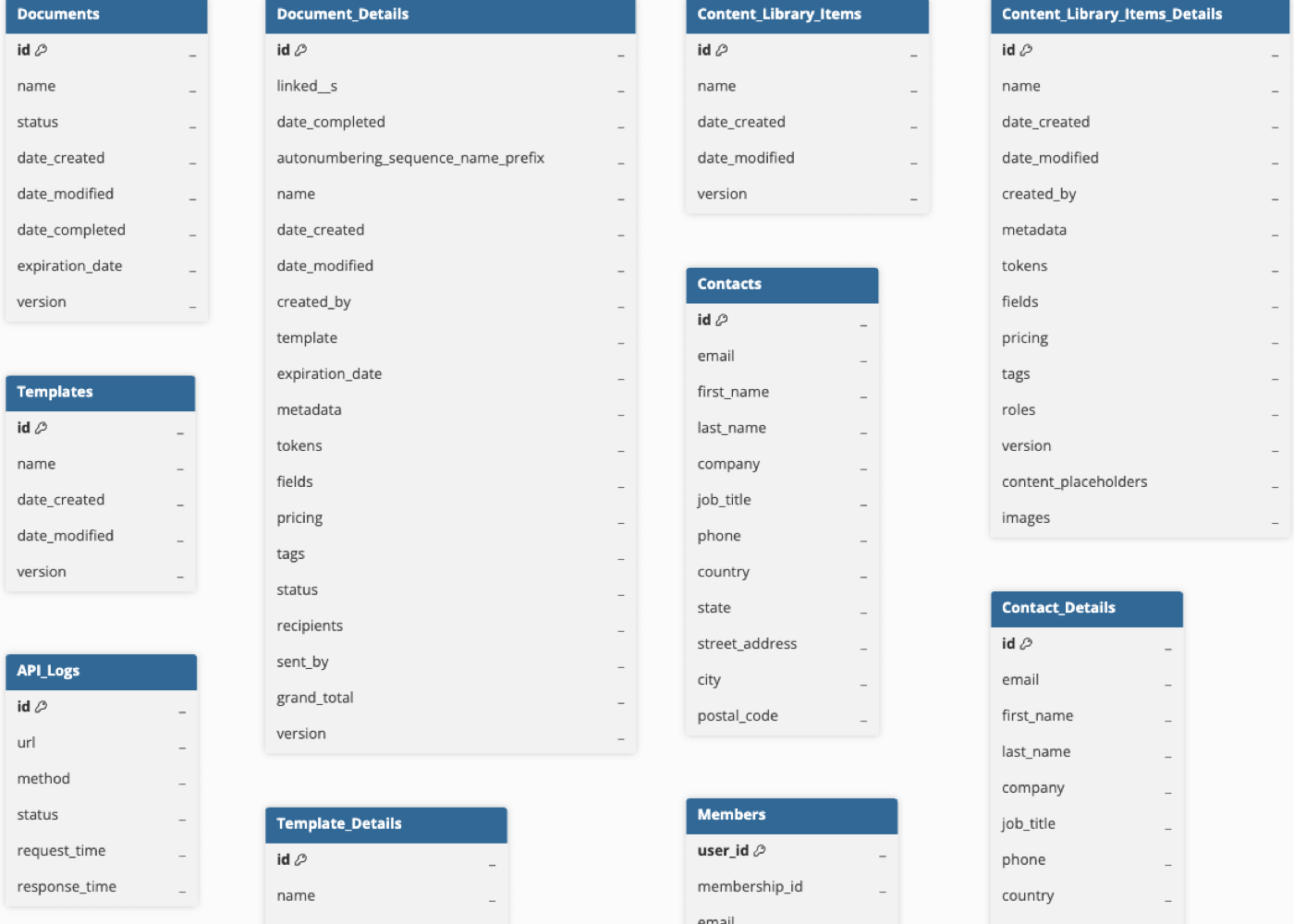PandaDoc is a sales platform that allows you to create, manage and track sales proposals and contracts. It provides a user-friendly interface to easily create documents and distribute them through multiple channels such as Slack, emails, and more. PandaDoc is easy to integrate with other software. It offers hundreds of customizable templates and electronic signatures for you to design and create your documents with ease.
Prerequisites
-
An active PandaDoc account from which data is to be ingested exists.
-
The API key is available to authenticate Hevo on your PandaDoc account.
-
You are logged in as an Admin user to obtain the API key. Else, you can obtain the access token from your administrator. Read User Types to know about the different types of user accounts and their related permissions.
-
You are assigned the Team Administrator, Team Collaborator, or Pipeline Administrator role in Hevo to create the Pipeline.
Obtaining the API Key
You require an API key to authenticate Hevo on your PandaDoc account. The API key does not expire and can be reused for all your Pipelines.
Note: You must log in as an Admin user to perform these steps.
Perform the following steps to create the API key:
-
Log in to your PandaDoc account.
-
In the bottom left corner of the page, click Settings, and then click Integrations.
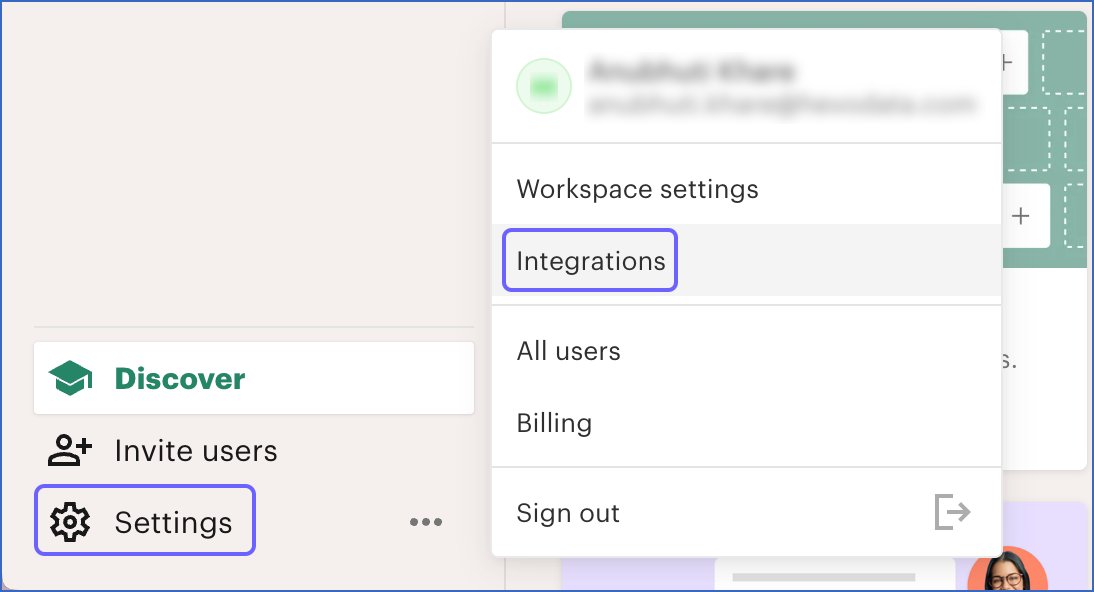
-
On the Integrations page, scroll down to the API and Webhooks section and click API.
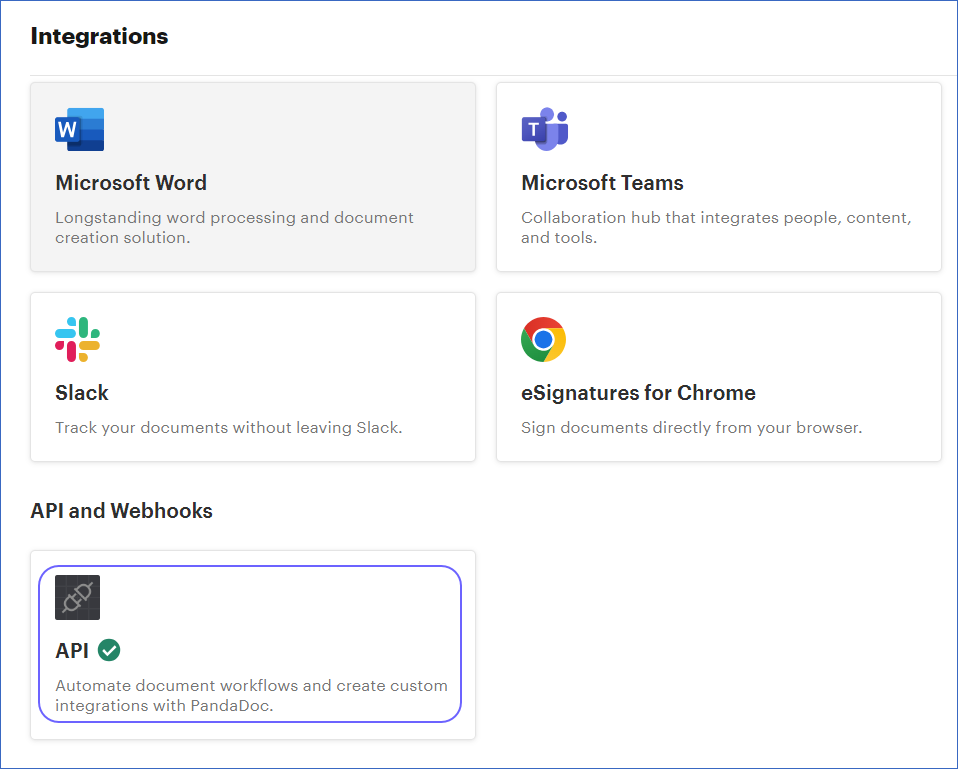
-
In the API keys section, click the copy icon to copy the API key. Use this key while configuring your Hevo Pipeline.
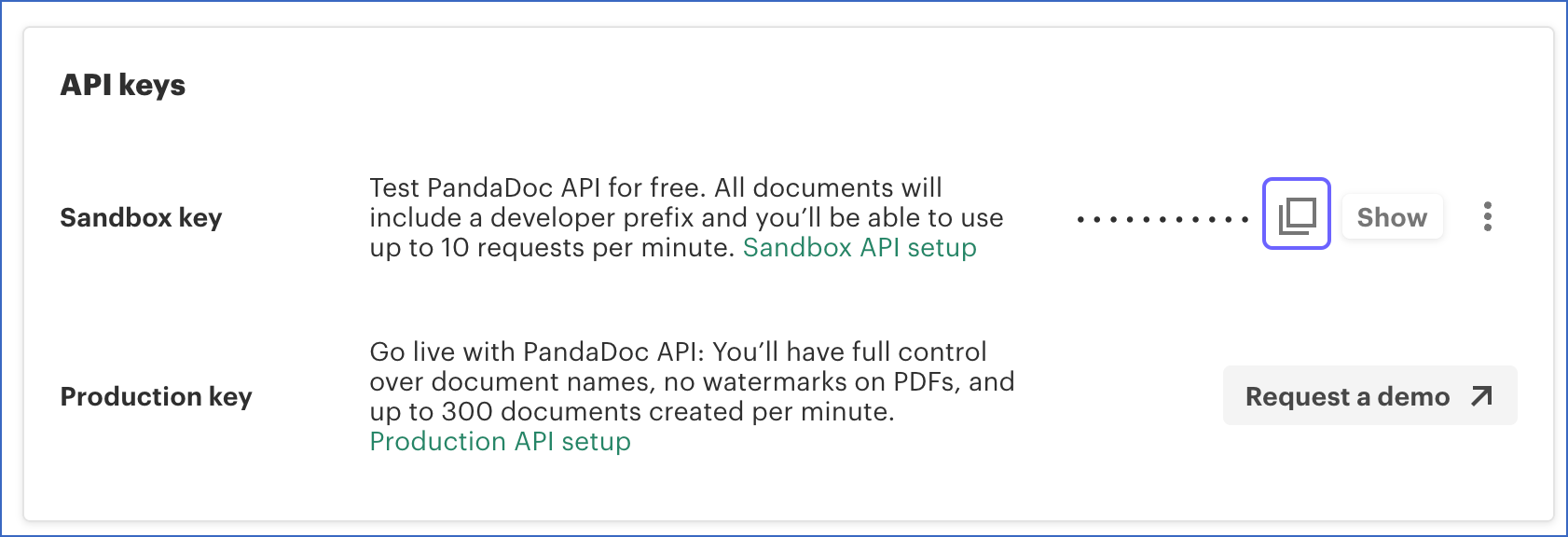
Configuring PandaDoc as a Source
Perform the following steps to configure PandaDoc as the Source in your Pipeline:
-
Click PIPELINES in the Navigation Bar.
-
Click + Create Pipeline in the Pipelines List View.
-
On the Select Source Type page, select PandaDoc.
-
On the Select Destination Type page, select the type of Destination you want to use.
-
On the Configure your PandaDoc Source page, specify the following:
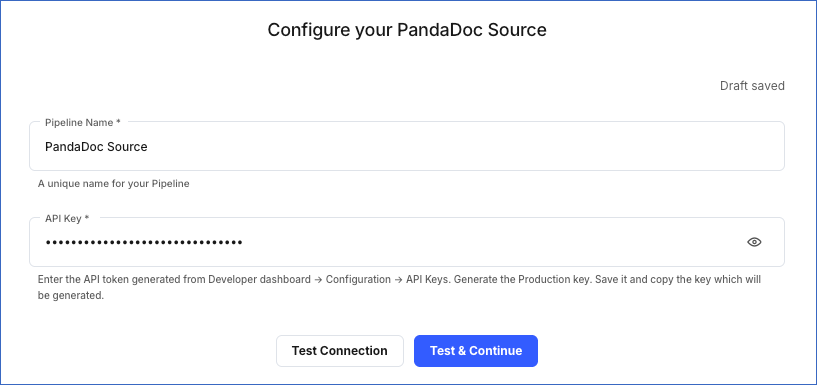
-
Pipeline Name: A unique name for the Pipeline, not exceeding 255 characters.
-
API key: The API key that you created in your PandaDoc account.
-
-
Click Test & Continue.
-
Proceed to configuring the data ingestion and setting up the Destination.
Data Replication
| For Teams Created | Default Ingestion Frequency | Minimum Ingestion Frequency | Maximum Ingestion Frequency | Custom Frequency Range (in Hrs) |
|---|---|---|---|---|
| Before Release 2.21 | 1 Hr | 1 Hr | 24 Hrs | 1-24 |
| After Release 2.21 | 6 Hrs | 30 Mins | 24 Hrs | 1-24 |
Note: The custom frequency must be set in hours as an integer value. For example, 1, 2, or 3, but not 1.5 or 1.75.
-
Historical Data: In the first run of the Pipeline, Hevo ingests all the existing data for the selected objects from your PandaDoc account and loads it to the Destination.
-
Incremental Data: Once the historical load is complete, all new and updated records for the Documents object are ingested as per the ingestion frequency. The remaining objects are ingested in Full Load mode.
Schema and Primary Keys
Hevo uses the following schema to upload the records in the Destination database. For a detailed view of the objects, fields, and relationships, click the ERD.
Data Model
The following is the list of tables (objects) that are created at the Destination when you run the Pipeline:
| Object | Mode | Description |
|---|---|---|
| Contacts | Full Load | Contains the list of people within your workspace with whom you have communicated. |
| Contact Details | Full Load | Contains details of all the people within your workspace with whom you have communicated. |
| Content Library Items | Full Load | Contains details of the frequently used document content that can be stored and reused in the future. |
| Content Library Item Details | Full Load | Contains details of words or values that are used frequently in a document, and which can be stored and reused in the future. |
| Documents | Incremental | Contains details of all the statuses associated with documents. |
| Document Details | Full Load | Contains details of all the information about a document, such as, name, completion status and more. |
| Documents Folder | Full Load | Contains details of all the folders in which your documents are stored. |
| Forms | Full Load | Contains details of all the documents which allows you to collect information about your website visitors, such as their name and email address. For example, a subscription form, in which users may provide their name and email address to sign up for your newsletter. |
| Members | Full Load | Contains details of all the users who are given access to workspaces, projects, and tasks in your PandaDoc account. |
| Member Details | Full Load | Contains details about all the Members in your PandaDoc account. |
| Templates | Full Load | Contains details of all the pre-defined document layouts. |
| Template Details | Full Load | Contains details of all information about the template, such as, name, IDs, tags and more. |
| Templates Folder | Full Load | Contains the list of all the folders in which your templates are stored. |
Source Considerations
-
Pagination: Each API response for each PandaDoc object fetches one page, with up to 100 records per page.
-
Rate Limit: PandaDoc imposes a limit of 2000 API calls per minute. If the limit is exceeded, Hevo defers the ingestion until the limits reset.
Limitations
-
Hevo currently does not support deletes. Therefore, any data deleted in the Source may continue to exist in the Destination.
-
Hevo does not provide you with the option to select the duration for loading historical data. All the historical data in your PandaDoc account is loaded when the Pipeline runs for the first time.
-
Hevo does not load data from a column into the Destination table if its size exceeds 16 MB, and skips the Event if it exceeds 40 MB. If the Event contains a column larger than 16 MB, Hevo attempts to load the Event after dropping that column’s data. However, if the Event size still exceeds 40 MB, then the Event is also dropped. As a result, you may see discrepancies between your Source and Destination data. To avoid such a scenario, ensure that each Event contains less than 40 MB of data.
Revision History
Refer to the following table for the list of key updates made to this page:
| Date | Release | Description of Change |
|---|---|---|
| Nov-12-2025 | NA | Updated the document as per the latest Hevo UI. |
| Oct-27-2025 | NA | Updated section, Obtaining the API Key as per the latest PandaDoc UI. |
| Sep-18-2025 | NA | Updated section, Configuring PandaDoc as a Source as per the latest UI. |
| Jul-07-2025 | NA | Updated the Limitations section to inform about the max record and column size in an Event. |
| Jan-07-2025 | NA | Updated the Limitations section to add information on Event size. |
| Nov-05-2024 | NA | Updated section, Obtaining the API Key as per the latest PandaDoc UI. |
| Mar-05-2024 | 2.21 | Updated the ingestion frequency table in the Data Replication section. |
| Dec-19-2022 | 2.04 | New document. |
